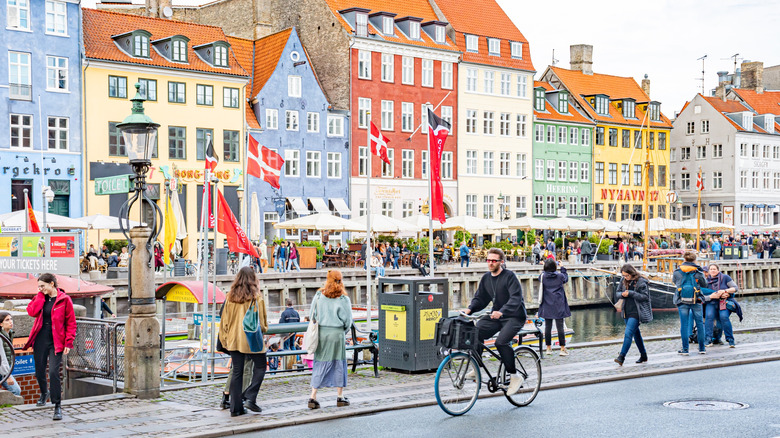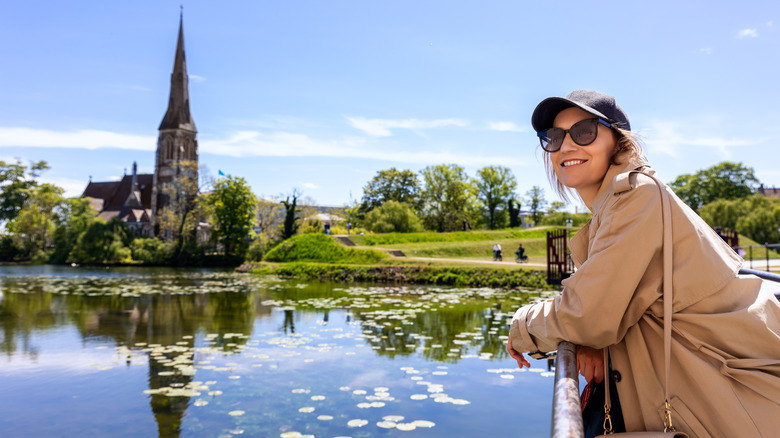The World's Happiest City Is A European Paradise With Bike Lanes, Green Spaces, And A 37-Hour Workweek
According to the Institute for Quality of Life's Happy City Index 2025, Copenhagen ranks No. 1 as the world's happiest city. Every year, the Institute for Quality of Life ranks cities based on 82 indicators such as education, access to green spaces, and the environment. Just a short train ride or flight from major nearby cities like Amsterdam and Berlin, Copenhagen excels in happiness. Even the city's airport is one of the world's least stressful airports. Residents bike to work and spend long weekends relaxing in parks and green spaces, thanks to a shorter 37-hour work week.
To experience why Copenhagen ranks so high on the happiness index, it's best to visit the city and see it the way locals do. Here, we will learn the research behind the study, and dive into how shorter workweeks, universal healthcare, and sustainable transportation adds up to real joy. The easiest way to get here is by train if you are coming from Sweden or Germany, or you can fly into Copenhagen Airport, which serves as a major transportation hub from other major cities in Europe and beyond.
Hop on a bike to see Copenhagen the Danish way
To fully understand why Copenhagen ranks as the world's happiest city, travel like a local does and hop on a bike. With over 239 miles of bike lanes in the city, it's no wonder why the Global Bicycle Cities Index 2022 ranked Copenhagen as the world's fourth most bicycle-friendly city. Not only does biking help promote physical and mental well-being, but it also helps you interact with your community. Of both biking and walking, the Happy City Index writes that this "increased social interaction can strengthen community bonds and promote a sense of belonging, both of which are essential for overall happiness." Paired with an efficient public transportation system and thought-out infrastructure, this makes the city stand out. The report says, as "a leader in green transportation, 69% of all travel in the city is environmentally friendly ... the city is a model of safe and sustainable transportation."
Plus, the city is generously rewarding eco-friendly tourists, making it easy to earn perks like free entrance to a museum in exchange for sustainable behavior, such as riding a bike. To rent a bike, check your hotel's reception to see if a free rental is included with your stay, or as an add-on. A popular bicycle-share program in Copenhagen is the Donkey Republic app. One option is to start your ride at the Little Mermaid statue near the Kastellet Fortress and end with a leisurely ride along the waterfront promenade at Islands Brygge. Another area you can visit is Rick Steve's favorite, a Hippie District that embraces the sustainability and car-free lifestyle.
Copenhagen prioritizes green spaces and work-life balance
Copenhagen is known for being a sustainable city, with over a quarter of the city being dedicated to green spaces. This means that at least 80% of the city's population lives within 300 meters, or about a quarter of a mile, from a green space. The Happy City Index research lauds the "city's efforts in organizing, planning, and expanding green spaces, including parks and areas for relaxation." Parks can help reduce stress, encourage physical activity, and foster social connection. "Exposure to nature has been shown to lower stress levels, reduce anxiety and depression, and improve overall mood. Residents living in areas with ample green space are likely to experience greater psychological benefits, contributing to a higher quality of life," the research says.
For visitors to Copenhagen, you are spoiled for choice when it comes to parks. From Denmark's oldest royal gardens, the King's Gardens, to even cemeteries that locals use for walks and relaxation like the Vestre Cemetery, parks and green spaces also serve as a social hub for residents to hold community events and activities. "These interactions can enhance social cohesion and create a sense of belonging, which is essential for overall happiness and community well-being," the research explains.
The city also has a 37-hour workweek, giving residents more time off to enjoy these parks. Fewer hours spent at work means employees can recharge physically and mentally, helping to reduce stress and prevent burnout. The Happy City Index writes, "Research has shown that regular breaks from work can lead to improved mental health and overall well-being." The work-life balance when combined with Copenhagen's universal healthcare, which boasts 4.4 doctors per 1,000 residents and a life expectancy of nearly 80 years, it's no wonder people here live longer, healthier, and more fulfilled lives.


